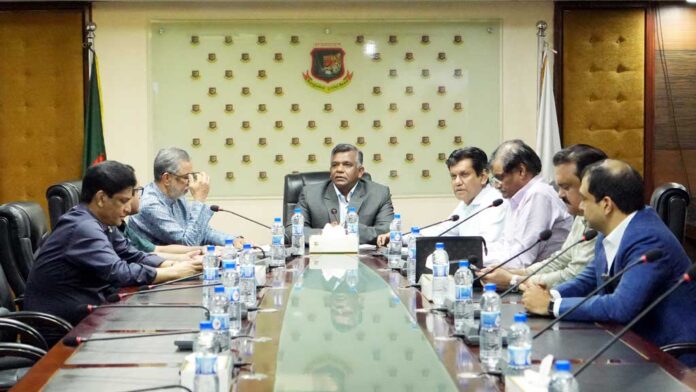When asked how new Bangladesh Cricket Board (BCB) President Aminul Islam Bulbul compares to his predecessors, Nazmul Hassan and Faruque Ahmed, Director Iftekhar Rahman’s reply made it clear that the new head of the board is already making a strong impression.
Aminul, famed for scoring Bangladesh’s first Test century on debut, was named the BCB’s 16th president unopposed on Friday evening.
Though his tenure is expected to be brief, Aminul got straight to work the very next day.
He was scheduled to meet with board directors at the BCB headquarters on Saturday, and staff had been waiting for his arrival since morning. The president finally arrived shortly after 1 pm.
Aminul began his day by meeting with department heads, including those from the Cricket Management Division, Women’s Cricket Wing, Game Development, and other standing committees, along with general staff.
He also toured the National Cricket Academy, engaging with players involved in the national Test team’s training camp.
In addition, Aminul attended the “BCB List A Umpires Workshop,” led by Sharfuddoula Ibne Shahid Saikat, the first Bangladeshi umpire to join the ICC Elite Panel.
At 3 pm, he presided over a board meeting that lasted nearly four and a half hours.
He opened the meeting with a presentation of his strategic plan, focusing heavily on the decentralisation of cricket activities.
Speaking at a press conference afterward, Director Iftekhar Rahman said, “We had a very fruitful discussion, which is why the meeting ran for almost four and a half hours. Our president shared a presentation based on his personal experience, and from it, we’ve already launched four new initiatives.”
“The programmes are titled: Protect the Spirit of the Game, High Performance for Everyone, Connect and Grow, and Transparency and Good Governance in All Areas. We’re committed to ensuring transparency in everything related to the board.”
But Aminul didn’t stop at his presentation. He urged directors overseeing various standing committees to submit their departmental and transition plans by June 30.
In his introductory press conference on Friday, Aminul had expressed his desire to spread cricket across all corners of the country — a priority that dominated Saturday’s board meeting.
As part of a pilot decentralisation project, the board plans to set up “mini BCB” offices outside Dhaka, with initial focus areas including North Bengal, Rajshahi, and the greater Dhaka-Chittagong zone.
To speed up implementation, Director Saiful Alam Swapon Chowdhury has been tasked with overseeing the northern zone, while Director Salahuddin Chowdhury will handle Dhaka-Chittagong.
The idea of decentralisation has long been discussed. During Nazmul Hassan’s leadership, experimental regional cricket bodies were established in Chattogram and Sylhet, but those efforts failed to gain momentum.
With renewed attention on decentralisation, many are wondering if this marks a fresh chapter for regional cricket governance. Iftekhar offered clarification:
“Given our limited experience, we’re approaching this as a pilot initiative. We’ve assigned two directors to immediately begin implementing it.
“Currently, school cricket is fully run from Dhaka — this needs to change. We’re building plans to decentralise this responsibility regionally and align earlier efforts with the new president’s vision.”
The board also reviewed revenue figures from the latest Bangladesh Premier League (BPL).
Faruque Ahmed, the outgoing BCB chief, had previously claimed the board earned more than Tk 130 million from ticket sales during the last BPL.
However, Iftekhar addressed discrepancies in that claim.
He stated that while the gross income from ticket sales was Tk 123.4 million, the net profit, after deducting management costs and sharing revenue with the BPL teams, was Tk 33.5 million.
Still, this figure doesn’t represent BCB’s full profit from the tournament. The board is currently owed more than Tk 210 million in franchise fees, television rights, and sponsorships.
“We’re hopeful about recovering these outstanding dues,” Iftekhar said. “If we manage to collect the full amount, the BCB’s profit from this BPL could be around Tk 7.5 million.”
However, past seasons have shown how difficult collecting these dues can be. Sometimes the board ends up covering losses from its funds.
So, was the BPL profitable this year? Iftekhar remained cautiously optimistic.
“If we can’t collect the dues, then yes — it will have been a loss. But if we succeed in doing so, we calculate that we’ll end up with a Tk 7.5 million profit.”
The meeting concluded with several key administrative decisions.The board resolved to recruit a Chief Financial Officer (CFO) from outside the BPL ecosystem and also agreed to bring in an HR consultant to overhaul the BCB’s human resources structure.
They also announced plans to launch an umpire development and digitisation programme.
The next edition of the Bangladesh Cricket League (BCL) was postponed to September, and the BCB will conduct a curator training course under the guidance of Toby Lumsden, a turf management expert with over 30 years of experience.



